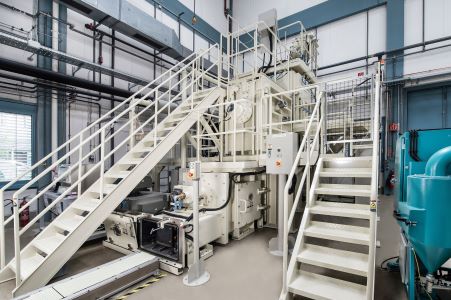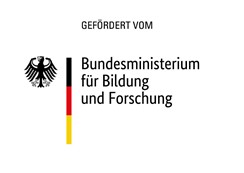Scaling of the 2-powder method for the production of permanent magnets with reduced content of critical elements
Permanent magnets based on rare earths (SE) significantly increase the efficiency of generators in wind turbines and motors in electric vehicles, among other things. They are therefore essential for a successful energy transition. However, the supply and mining of SE is considered very critical by the EU. This is where the currently launched Scale2PM project of the Technical University of Darmstadt together with the Fraunhofer IWKS comes in: The aim is to validate a novel manufacturing process to produce permanent magnets with better or equivalent properties while using fewer resources.
The use of SEs is associated with a high supply risk, as SEs are only found in certain areas of the world. "Rare earths are not necessarily rare, but they are critical, as more than 90 percent of rare earth elements are imported from China, which is why there is a clear monopoly position here," explains Prof. Dr. Oliver Gutfleisch, Technische Universität Darmstadt and coordinator of the project. He continues, "The heavy SE dysprosium (Dy) and terbium (Tb), which are needed in every high-performance magnet for increased application temperatures, are considered particularly critical." In addition, there are ecological considerations, as mining the SEs in their current form severely pollutes the environment with poisoned sludge consisting of heavy metals, fluorides and radioactive substances. In combination, this implies that the use of especially heavy SE elements in products must be reduced.
2-powder method secures demand and protects the environment
This is where the novel manufacturing process, internationally patented by the TU Darmstadt, comes in, enabling the critical SE content in the magnetic material to be significantly reduced. This is because 90 percent of all Nd-Fe-B permanent magnets are manufactured using a powder metallurgical sintering process, in which the starting material is first ground into a metal powder and then compacted into a solid by heat treatment. In the innovative method, two Nd-Fe-B-based powders with different finenesses and defined magnetic properties are also mixed. This makes it possible to concentrate the SE at the decisive points in the microstructure of the material and to drastically reduce its other volume. To be defined within the project is the exact chemical composition of the 2-powder fraction and thus its magnetic properties as well as the practicable particle size differences. "With the new method, we can not only moderate the rapidly growing demand for SE for permanent magnets in electromobility and wind power while ensuring more stable prices, but also protect the environment," says Prof. Dr. Anke Weidenkaff, Institute Director of Fraunhofer IWKS, summarizing the advantages of the 2-powder method.
The Scale2PM project is part of the Federal Ministry of Education and Research's funding measure "Validation of the Technological and Societal Innovation Potential of Scientific Research - VIP+" and supports researchers* in systematically validating research results and opening up areas of application. Behind this is the goal of the Federal Government to make the diverse application potentials of excellent research available even faster and more efficiently and to further strengthen the bridge between academic research and its commercial exploitation or societal application.

